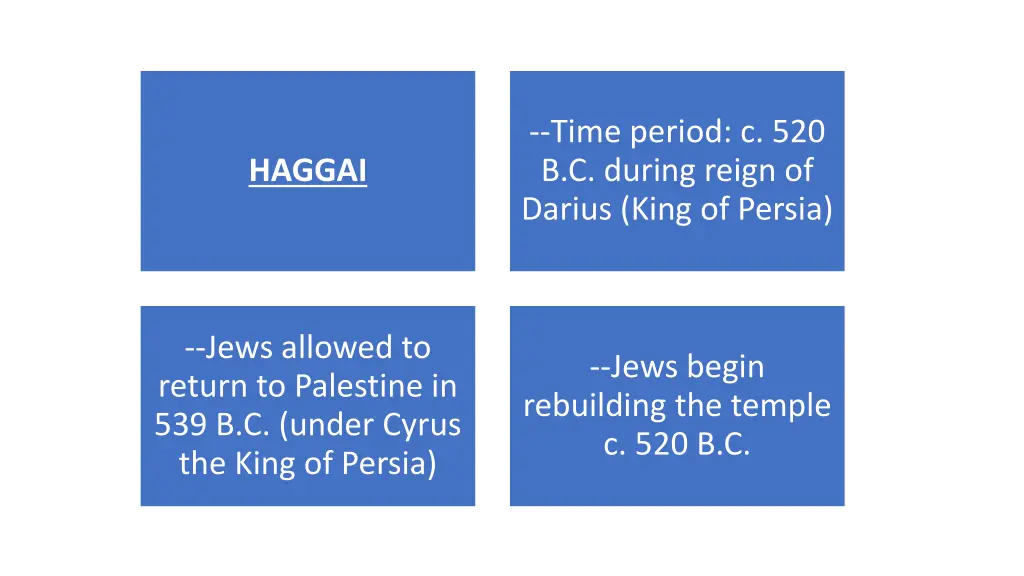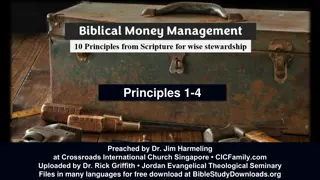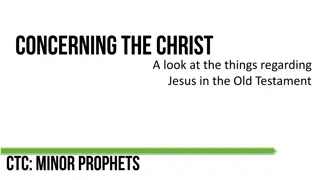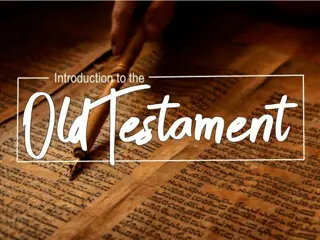
Haggai's Call for Temple Rebuilding in 520 B.C. Under Darius
Explore the historical context of Haggai's message delivered in 520 B.C. during King Darius' reign in Persia. Discover the significance of the Jews rebuilding the temple and reflect on the attitude and response of the people as outlined in the book of Haggai.
Download Presentation

Please find below an Image/Link to download the presentation.
The content on the website is provided AS IS for your information and personal use only. It may not be sold, licensed, or shared on other websites without obtaining consent from the author. If you encounter any issues during the download, it is possible that the publisher has removed the file from their server.
You are allowed to download the files provided on this website for personal or commercial use, subject to the condition that they are used lawfully. All files are the property of their respective owners.
The content on the website is provided AS IS for your information and personal use only. It may not be sold, licensed, or shared on other websites without obtaining consent from the author.
E N D
Presentation Transcript
--Time period: c. 520 B.C. during reign of Darius (King of Persia) HAGGAI --Jews allowed to return to Palestine in 539 B.C. (under Cyrus the King of Persia) --Jews begin rebuilding the temple c. 520 B.C.
Haggai Timeline We read that in the second year of the reign of Darius, then king of Persia, In the sixth month, in the first day of the month, came the word of the Lord by Haggai the prophet unto Zerubbabel governor of Judah, and to Joshua the high priest (Haggai 1:1) Translating this date from Jewish calendar to our own, it seems that Haggai s message was delivered on August 29, 520 BC. On this day, Haggai spoke to Zerubbabel (the political leader of the Jewish people) and Joshua (the ecclesiastical leader of the Jewish people).
The Peoples Attitude Haggai 1:2-10 These verses are really powerful! To make sure you understand them, rewrite these verses in your own words
The Peoples Attitude Haggai 1:2-10 How are we like the people of Haggai s time? How do we need to consider our ways?
A little over a year ago I made up my mind that by planning my affairs, by staying away from lectures or concerts or theatres or operas, I could go to the temple at least once every week and have ordinances performed in behalf of some of my loved ones who had passed away. By making up my mind that I could do this I had no difficulty whatever in going through the temple once a week during the entire year. True, I have had to miss perhaps an opera or theatre or some other function at which I should have liked to be present, but I have had no difficulty whatever. We can generally do that which we wish to do. A young man can find an immense amount of time to spend with his sweetheart. He can arrange affairs to do that. We can arrange our affairs to get exercise in the shape of golf and otherwise. We can arrange our affairs to have amusements. And if we make up our minds to do so we can arrange our affairs to do temple work, judging from my own experience. I believe that if I can find the time to go to the temple and to do temple work once a week, there is hardly a man in the entire Church of Jesus Christ of Latter- day Saints but that can find time if he wishes to plan his work accordingly. I am speaking of people who live where there is a temple, and not of people who have to travel a long distance to get there. I do not know of any one that is any busier than I am, and if I can do it they can, if they will only get the spirit in their hearts and souls of wanting to do it. The trouble with so many people is they do not have the desire. (Teachings of Presidents of the Church: Heber J. Grant, (2004))
What is the command in Haggai 1:7-8? What is the response of the leaders and people in 1:12-14? *Jews began rebuilding the Second Temple c. 520 B.C. Haggai s Commandment and the
What has President Nelson been teaching about the temple? Are we following his counsel like the people in Haggai s day?
Each of us face different circumstances and challenges. Are we inadvertently putting too much of our time and energy in good things, while neglecting the temple or other eternal things? Haggai invites us: Consider your ways (Haggai 1:7). As we properly prioritize the temple in our lives, the Lord will, From [that] day, bless us.
Consider this analogy Consider this analogy Why do we have the phrase, One bad apple can spoil the bunch ? Is this really true?
Haggai and Rotten Apples Haggai and Rotten Apples (contagious things) (contagious things) On the twenty-fourth day of the ninth month (December 18, slightly less than four months after Haggai s first address), the Lord spoke to Haggai and invited him to ask two questions to the priests. These questions are as follows: If one bear holy flesh in the skirt of his garment, and with his skirt do touch bread, or pottage, or wine, or oil, or any meat, shall it be holy? (Haggai 2:12) If one that is unclean by a dead body touch any of these [bread, pottage, wine, oil or meat], shall it be unclean? (Haggai 2:13) While these questions may seem strange to modern readers, they were quite straightforward in Haggai s time. Priests had the responsibility of determining what was clean and unclean, and had been given clear instructions by Moses as to how to make these distinctions. Understanding these questions can help us understand why Haggai asked them, and why they are important to us.
Haggai and Rotten Apples Haggai and Rotten Apples (contagious things) (contagious things) The first question essentially asks, If I m carrying something holy, and the material carrying the holy thing touches something else, will that thing become holy? The response of the priests is no, the item that comes in contact with the holy thing will not become holy (see Haggai 2:12). The second question is similar, but with an important difference. In essence it asks If a person is unclean, and comes in contact with another item, will that item become unclean? The response of the priests is yes, that item will now be unclean (see Haggai 2:13). This was based on the holiness laws found in Leviticus. Haggai s point is that unholy things are much more contagious than holy things. It s harder to catch righteousness than it is to be infected with unrighteousness. In other words, the unholy actions of the people in not building a temple, had previously spread to other aspects of their lives. Living in a fallen world makes it so the natural direction the natural man or woman goes is away from holiness. This was partially why it was so important for people then (and now) to consider their ways and prioritize the temple.
Haggai and Rotten Apples Haggai and Rotten Apples (contagious things) (contagious things) While Haggai s teachings about uncleanliness may seem strange to us, there is an important principle. It s harder to catch righteousness than it is to be infected with unrighteousness. So what are we doing to stay away from sin, and actively cultivate righteous? How does this relate to efforts to build the temple?









